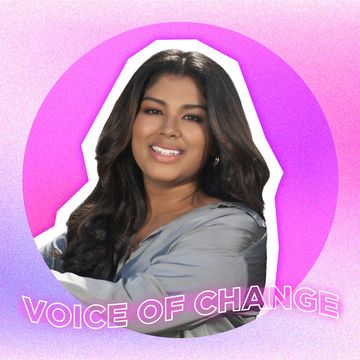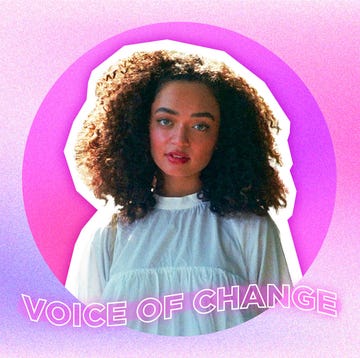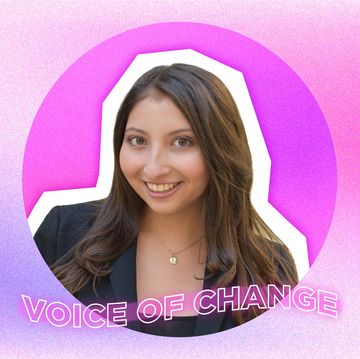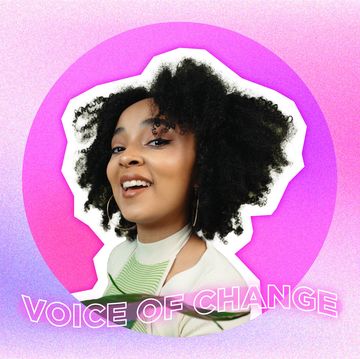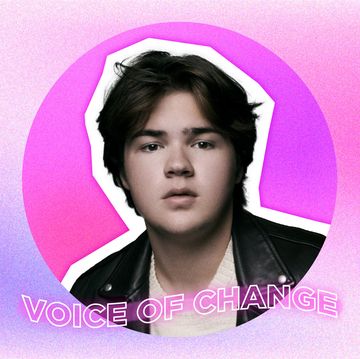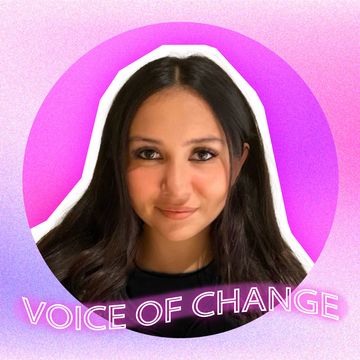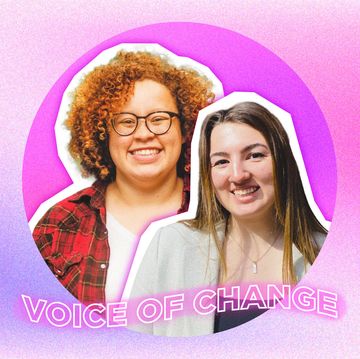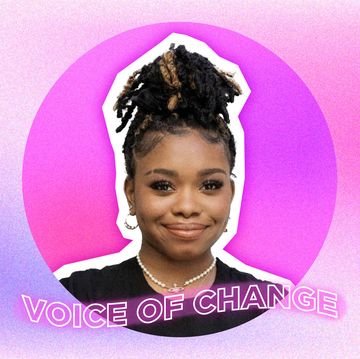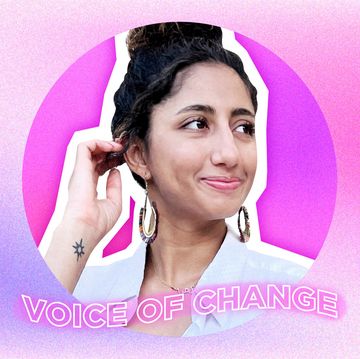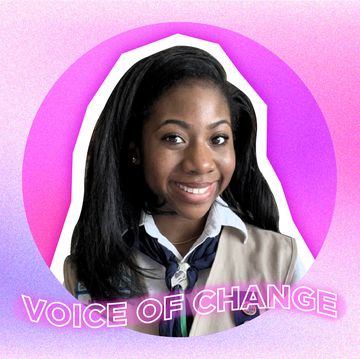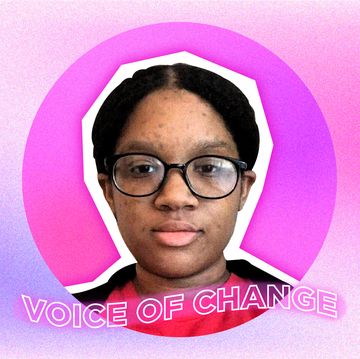Even during the most challenging times in history, it's important to highlight those who are continuing to follow their dreams and are taking strides to make the world a better place. Each month, Seventeen is honoring young people as Voices of Change, those who are making a difference in their community and the world at large.
Shiva Rajbhandari didn’t run for the Boise, Idaho School Board of Trustees for himself — he ran for his peers, his teachers, and all students across the district that deserve a voice in their own education.
In the fall of 2021, following an extensive, two-year effort to present a long-term sustainability plan for Boise schools to the board — and one particularly frustrating appointment with his principal — Shiva’s decision was made. “There was this culture that saw students not as constituents of the school board, not as the primary stakeholders in our education, but as a nuisance,” Shiva told Seventeen.
He announced his candidacy in June 2022, and on September 6, days after his 18th birthday, Shiva won and became the first student ever elected to the Boise school board. He defeated the far-right incumbent candidate, who failed to reject an endorsement from a local extremist group that encourages censorship.
According to Shiva, his win marks a much needed, long overdue change for Boise and represents the irrefutable power of young people mobilizing together to make a change. “My election to the school board is not a one-off thing,” he shared. “We're boots on the ground in the classroom. We know what's going on in our schools. All we need is the voice and the vote to make it better.”
Although already a longtime climate activist, and gun control and mental health advocate, Shiva’s journey in changemaking is just getting started. For his unwavering support for teachers and students across his city — and country — and his tireless efforts to expand climate education, Shiva Rajbhandari is recognized as a Seventeen Voice of Change.
What inspired you to run for the school board?
Shiva Rajbhandari: I got involved with school board politics while working with students across the school district at the Idaho Climate Justice League, organizing a clean energy commitment and long term sustainability plan for our schools. In the Boise school district, energy's our second largest expenditure and we could save about half of that energy budget each year by 2030 with this long term sustainability plan. So for two years, we reached out to our school board members. We sent dozens of emails, organized postcard drives (sending over 300), and delivered the largest petition our school district had ever received. But we didn't get a lot of engagement from our board members.
Last fall, I sent a letter to our school board president asking for a meeting. I didn't immediately get a response, but I know he read the letter because about a week later, I was called to my principal's office and reprimanded for reaching out to our board members. To me, that highlighted this lack of student involvement in educational decision-making in our school district. That was when I decided to run for the school board and change that.
Our schools — especially here in Idaho — have also been under attack from far-right extremists. Our lieutenant governor put together this indoctrination task force with a goal of undermining our public schools and undermining our public school teachers. We protested, but the district wasn’t providing our teachers or students the support they deserved. One time, I walked into my English class and half of an assignment was blacked out like a CIA document because my teacher was intimidated. It felt like our school district didn’t have our back.
What does it signify having a student on the school board?
SR: It’s representation. Students should be involved at all places where decisions are being made, but especially where decisions are being made in education. I want to show just how much students can bring to the table when we're given a seat.
Apart from winning the election, what was the biggest highlight from your run? What was the biggest challenge?
SR: The biggest highlight was meeting so many different people and hearing so many perspectives on education, particularly from students. I want to raise all of us up and tell all students that your voice is welcome here. We want you to be involved in making decisions for our schools.
The biggest challenge was ageism. I'm so qualified to be on the school board. I've been an advocate for climate education. I've been a voting rights advocate here in Idaho. I'm on the Boise School District Sustainability Committee. I was the ASB vice president of my Student Council junior year. I’m very, very involved in the school district and our community and very invested in our schools. And yet some people still said I wasn’t qualified because I'm only 18. It was frustrating because they’re not looking at my qualifications. They’re profiling me based on my age. If you're 18, you're allowed to serve your country, so why can't you serve your schools?
When did you first get involved with activism?
SR: I learned about climate change in the seventh grade. It was super isolating because at the time, the media wasn't really talking about it and our world leaders really weren't addressing it. When you're 13, that's a really big thing. So for a year and a half, I had climate anxiety looming over my head. Then in ninth grade, there was a climate strike organized by the Sunrise Movement here. That turned this sense of isolation into a sense of empowerment, seeing over 1500 of my peers coming out to the capital and demanding our elected leaders to take action. I got involved with the Sunrise Movement and later started the Extinction Rebellion Youth chapter here in Boise. I started the green club at my school and got involved with saving wild salmon and steelhead.
How do you balance being on the school board and being a full-time student?
SR: It’s a little hard. I've kept a Google calendar since the tenth grade and that really helps. I make sure I get eight hours of sleep a night. I schedule meetings during lunch, before school, and after school.
How else do you protect your mental and emotional health?
SR: Rest. It’s all about regenerative culture. I’m lucky to be a part of this big team because there is room to rest. There are other students who are just as qualified as me to carry the torch. I go camping on the weekends. Running is my “me time.” I make space for myself and take time to myself.
What do you most hope to achieve during your time on the school board?
SR: The biggest impact will be the establishment of a student position on the school board. I will set a precedent for a student voice in our schools. Once students have the means to participate, the sky really is the limit.
My top priority is addressing mental health in our schools — and that's a really multifaceted challenge. At Boise High, where I attend, our student counselor ratio is one counselor to 375 students, whereas it should be one to 250. We need to hire more mental health professionals in our school. We need to provide those resources to every student. We need to provide resources for teachers to talk about mental health in the classroom and avenues to make it part of our curriculum. It's about de-stigmatizing and making space for students to feel comfortable, for students to recognize their own mental challenges and know how they can face them and where they can get help. We also need to move our schools to later start times. The CDC and the American Academy of Pediatrics say no school should start before 8:30 AM.
Climate action is also really important to me, like the long-term sustainability plan [mentioned above]. I want to see our board approve that plan by the end of this year.
What are your plans for the future?
SR: Go to college. I want to be an environmental lawyer because of all the work I've done with salmon and steelhead conservation. It’s shown me the power you can have with litigation and how you can give a voice to the voiceless.
What does being a Voice of Change honoree mean to you?
SR: It’s a really big honor, but it's a really big responsibility. On the school board, I'm not just carrying myself. I'm carrying this idea of having students in government and having student representation. All of us have the power to make change in our communities. You all can change the world.
Leah Campano is an Associate Editor at Seventeen, where she covers pop culture, entertainment news, health, and politics. On the weekends, you can probably find her watching marathons of vintage Real Housewives episodes or searching for New York City’s best almond croissants.



